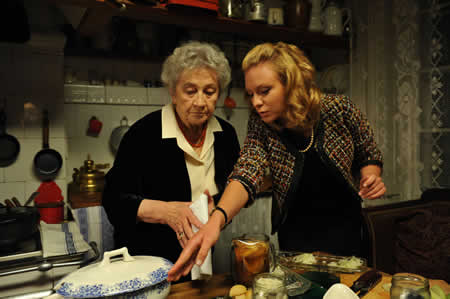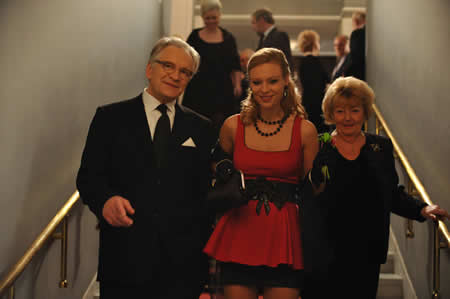 “Little Rose”, the gripping Polish post-war intelligence drama will play at the 2010 Palm Springs International Film Festival. Considered for the 2010 Golden Globes Best Foreign film. It failed to make the Shortlist. It would have made mine.
“Little Rose”, the gripping Polish post-war intelligence drama will play at the 2010 Palm Springs International Film Festival. Considered for the 2010 Golden Globes Best Foreign film. It failed to make the Shortlist. It would have made mine.
Inspired by the life of Paweł Jasienica (A.K.A.Leon Lech Beynar) a Polish historian and journalist who was persecuted by the Polish Communist government as a political dissident), Jan Kidawa-Blonski’s powerful “Little Rose” details the government’s total infiltration of the lives of private citizens-artists and members of the intelligentsia during the Soviet bloc years in Poland. Ironically Beynar, a member of the Polish underground, fought the Nazi’s in World War ll, then the Soviets after the war.
Jasienica’s wife, inserted into his life by the security services, had informed on her husband and his friends for years, even filing a report on his funeral. Like “The Lives of Others,” “Little Rose” is a compelling drama about the pervasive Soviet repression in the satellite countries of the Soviet Block and its power to deform the lives of its citizens.
Stalin’s U.S.S.R. had systematically purged Jews (the trumped up show trials of “The Doctor’s Plot” was the most infamous example.) Stalin reputedly said, “Every Jew is a potential spy.” In 1967, when Israel defeated Soviet allies Egypt and Syria in the Six Day War, the People’s Republic of Poland went after the “Jewish Fifth Column”, as an excuse to decapitate the liberal opposition movement. Jewish writers, teachers, professors, party officials and other culturally important figures were expelled from the Communist Party, branded as Zionists and stripped of their citizenship, leading to mass emigrations. Over 20,000 Polish Jews lost their jobs.
Colonel Roman Rozek (Robert Wieckiewicz-”Superprodukcja”) of the Security Services is ordered to bring down the respected professor and writer Warczewski (Andrzej Seweryn- “The Reverse”, “Schindler’s List.” “Indochine.”) Hoping to label him as a hidden Zionist, Rozek sics his sexy girlfriend Kamila (Magdalena Boczarska) on the unsuspecting prof. At first naive Kamila hopes to please her swaggering lover, ineptly reporting on the older Warczewski (the covert writer of a famous series of reports for Radio Free Europe.)
Rozek is a crude lover, given to boozy encounters. When grateful Rozek rewards Kamila with expensive perfume, its light years away from Cary Grant and Ingrid Bergman’s compromised  romance in “Notorious.” Rozek produces an invoice and asks her to sign, “The People’s homeland can be grateful.” Fighting for his own survival, it’s the most romantic remark he can come up with.
romance in “Notorious.” Rozek produces an invoice and asks her to sign, “The People’s homeland can be grateful.” Fighting for his own survival, it’s the most romantic remark he can come up with.
While Rozek trains her in spycraft, Kamila begins to enjoy the romantic attentions of her cultured “boyfriend.” Warczewski gives her books (Czeslaw Milosz) and encourages her “writing”, unaware that she’s penning reports on his life. Bit by bit, Kamila transforms, as her new husband broadens her political awareness. Warczewski’s friends are appalled by his romance with the “girl from nowhere” but the couple eventually marries.
“Little Rose” (Kamila’s code name), becomes disenchanted with her brutish young lover, but is afraid to stop spying for the Secret Services, continuing to report on her husband and his friends. Rosek, himself persecuted as a “hidden Jew,” becomes unhinged with jealousy as Kamila drifts away, enabling his final tragic act, both personal and political.
Director, co-writer Kidawa-Błonski has crafted a fascinating intimate drama set against a historical canvas. The toxic romantic triangle, with all of its guilty contradictions, is well played by the cast. Więckiewicz is riveting as the driven officer haunted by the dangerous game he’s playing. Tyro actress Boczarska captures the queasy transformation from slutty party girl to compromised Party spy. Each character in the triangle is fighting for survival, in the “Terror” atmosphere of a totalitarian state on the brink of huge transformations.
Kidawa-Błonski weaves archival footage of the 1967-68 with gritty footage from cinematographer Piotr Wojtowicz to recreate a sense of period immediacy.
